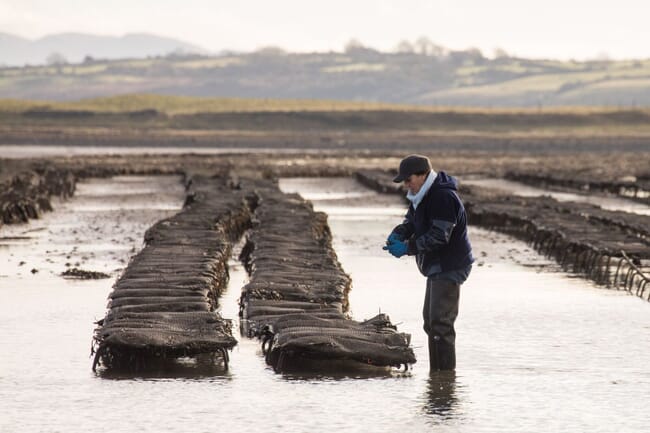
© Triskell Seafood, Ireland
The paper, led by the Centre for Sustainable Aquaculture Futures, was published in the journal Nature Food. It applies the one health approach – the complex interaction of human, environmental and animal health – to identify a set of success metrics that are proposed for inclusion into national aquaculture strategies across the globe, to improve sustainability as the industry expands.
It recognises that societal buy-in, equity of access to the food produced, and environmental protection must be adequately addressed.
Lead author, Professor Grant Stentiford from Cefas, said: “This is an important paper from my perspective – acknowledging that aquaculture is set to deliver most of our seafood by 2050, but also that sustainability must be designed-in at every level and, that the one health approach offers a tool for governments to consider how and where policy is designed and evidenced.
"I hope it will become a blueprint for how government and industry interact on these issues in the future. Most importantly, it considers aquaculture’s evolution from a subject studied by specialists to an important food sector – requiring now a much broader interaction with policy and society than arguably has occurred in the past.”
Aquaculture (and the food it produces) has played a major role in lifting millions of people out of poverty in many low- and middle-income nations, but a range of sustainability issues have been highlighted. These include the requirement for wild-caught fish meal and fish oil to produce feeds for parts of the industry, environmental degradation, overuse of antibiotics, release of disease agents, poor labour practices and gender inequality.
Negative societal impressions created by such examples (and applied to the industry as a whole) mask the potentially significant benefits of increased farming of cold-blooded animals, many of which do not require feeding, in a smaller footprint than may be required for other forms of food production.
Senior co-author, Professor Charles Tyler from the University of Exeter, said: “The paper results from extensive interaction between a wide range of academic experts in aquaculture, health, environmental and social sciences, economists, industry stakeholders and policy groups to identify how future aquaculture might best be developed to enable the industry to expand in the most sustainable manner.
"In a world where pressure on our environment is increasing, better food system design is critical, and aquaculture has a big part to play in that. We hope that the viewpoint offered here gains wide acceptance and helps to secure further development of aquaculture in its most environmentally sustainable form(s) for societal benefit globally.”
UC Santa Barbara assistant professor Halley E. Froehlich was also involved in the research and pointed out why the one health approach is so relevant to the sector.
“Aquaculture is everywhere and nowhere at the same time. People don’t realise how integrated it is into so many facets of marine ecology, conservation biology, and fisheries,” she said.


